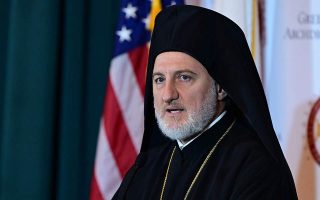A tale of two Greek-Australian diaspora poleis

The Greek Orthodox Community of Melbourne’s (GOCM) Board of Management has recently commenced a comprehensive review of its Articles of Association, commonly known as the constitution. This coincided with the approval received by the cosmopolitan Hellenic Club of Canberra for a $146 million redevelopment, which will includes a 16-story office building, a hotel with 151 rooms, restaurants and a rooftop infinity pool, a new auditorium, multicultural facilities and a roofed “Agora.”
The contrast of these two Greek-Australian communities is as stark as the one described in the following passage of “A Tale of Two Cities” by Charles Dickens:
“It was the best of times, it was the worst of times, it was the age of wisdom, it was the age of foolishness, it was the epoch of belief, it was the epoch of incredulity, it was the season of light, it was the season of darkness, it was the spring of hope, it was the winter of despair.”
The prosperity and entrepreneurship of the Hellenic Club is also reflected in its large membership base of 50,000 plus, which by far exceeds the 1,500 members (or so) of the GOCM, especially when one notes that Melbourne is by far a more populous city compared to Canberra, and is considered the “capital” of the Greek diaspora. The vision and cosmopolitanism of the Hellenic Club is reflected in its contemporary constitution when compared to the archaic GOCM constitution which is 85 years old. It must be also mentioned that the Hellenic Club (despite its size and being a Canberra icon) keeps a low and humble profile, at least with regards to its relationship with Greek governments and politicians.
Against this background, at the last Annual General Meeting (AGM), the members of the GOCM pushed for a review of the decades-old constitution, so as to bring it up to date with current societal changes. In its current form, it is highly convoluted and discriminatory, as well as being founded on the 1938 Companies Act, which has been repealed, raising questions about the validity of the constitution to an outside observer.
Adapting
It is rather odd in 2023 that, according to Article 4, “Membership of the Community shall be confined to Greeks and to persons born of Greek parents or having a Greek mother or father and the descendants of such persons who are adherents to the teachings of the Greek Orthodox denomination and are of the age of 18 years or over.” As is that “The Committee may refuse to admit any person falling within the said class without giving any reason for such refusal.” It was in this spirit that members at the last AGM sought a change aspects of the constitution to reflect (like the Hellenic Club) the secular, multi-faith and cross-cultural composition of the contemporary Greek-Australian community. Australia is one of the top 10 most secular countries in the world, more so since the last census, thus building a model of community as represented by the current constitution GOCM is unsustainable.
The entrepreneurship of the Hellenic Club is reflected in its large membership base of 50,000 plus, which by far exceeds the 1,500 members (or so) of the GOCM
Article 1 is also outdated by declaring the membership to be a thousand even though the General Committee may whenever they think fit register an increase of members. It seems to have been followed literally given its very low membership (about 1,500 members) considering that Melbourne is the “capital” of the Greek diaspora, and as such is not truly representative of the vibrant and dynamic Greek community of Melbourne. Indeed, according to the 2021 Australian census, Melbourne has the largest Greek population in Australia at 181,200, which translates to a GOCM quota of 0.8%. Given the antiquated nature of its constitution and its low membership, it is not ethical for the GOCM to purport to represent the Greek-Australian community, including its representations in Greece, and Article 1 should set a target for a membership of at least 10,000. It also stands to reason that a more vibrant membership base will impact positively on the Greek language and culture programs in Melbourne, among other things.
Church relations
Next, the labyrinthine nature of the GOCM constitution is also reflected in a number of articles which are devoted to the management of its five Greek Orthodox churches, the priests and the unclear relationship with the Greek Orthodox Archdiocese of Australia. In essence, the churches and everything related to the financial management of the churches is exclusively a matter for the Community. The spiritual jurisdiction belongs to the Archdiocese, as well as the supervision of the priests that are paid by the GOCM. Yet, these constitution articles make no reference to the relationship with the Greek Orthodox Archdiocese of Australia and give the impression that both the financial management and the spiritual jurisdiction belong to the GOCM.
The separation with the church in consultation with the Greek Orthodox Archdiocese of Australia ought to be put on the table as an option. After all, it is no coincidence that the Archbishop of Athens himself recently spoke more clearly in favor of the separation of Church and State than the political parties: “We must admit that not having boundaries between [Church and State] or the mixing of their duties creates enormous problems… the need for the distinct, but also cooperative course of the two bodies, Church and State, has become felt,” he said. “Today we are living in decline, which is why this whole history must become a lesson and to follow – State and Church – a parallel course without any interference of the one in the course of the other.” (Source: Ecclesia.gr). The same logic applies to the relationship between the Archdiocese and the GOCM, and the Greek-Australian community of Canberra is a case in point.
Against this background, in every respect this seems to be the right time to develop a visionary constitution as well as cut the Community and Church Gordian knot. This desire is also aligned with the letter sent to GOCM by Archbishop Ezekiel on November 25, 1970, declaring that the “Archdiocese recognizes your statutes as they have today, apart from the articles on their ecclesiastical dependence, which we request to be adapted to our extended condition.”
Finally, Greek governments must be discerning and able to research the structure of the Greek diaspora for the purpose of their dealings and policy formulation.
Dr Steve Bakalis is an expert on international business education and management, he has held adjunct appointments with the Australian National University and the University of Adelaide, and appointments in universities of the Asia Pacific and the Gulf regions.





